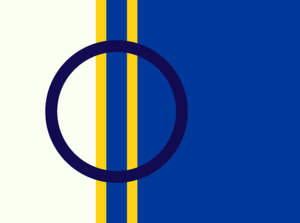Difference between revisions of "Archive:Yokultans"
m |
|||
| (One intermediate revision by the same user not shown) | |||
| Line 42: | Line 42: | ||
}} | }} | ||
The '''Yokultans''' ({{small|[[Niryokulta]]:}} ''Jokulčald'' [ | The '''Yokultans''' ({{small|[[Niryokulta]]:}} ''Jokulčald'' [ˈjokʰʊɫt͡ɕɑɫt]; {{small|[[Ngumyokulta]]:}} ''Joǩõlčäld'' [ˈjoxɤɫt͡ʃɑɫt]; {{small|[[Duryk]]:}} ''??'' [...]; {{small|[[Ngeyv]]:}} ''??'' [...]) are an ethnic group that originally comes from northwest [[Miraria]]. The vast majority of them lives in [[Akamyokulta]] and minorities also reside in [[Durykia]] and [[Ngeyvger]]. | ||
==Language== | ==Language== | ||
Revision as of 12:10, 29 June 2020
 Flag of the Yokulta nation | |
| Total population | |
|---|---|
| c. 60,000 (2018 estimate) | |
| Regions with significant populations | |
| 7,000 | |
| 2,000 | |
| remaining 3 thousands lives in some other countries | |
| Languages | |
| Niryokulta, Ngumyokulta, Duryk, Ngeyv | |
| Religion | |
| Ahpejokulčaldid | |
The Yokultans (Niryokulta: Jokulčald [ˈjokʰʊɫt͡ɕɑɫt]; Ngumyokulta: Joǩõlčäld [ˈjoxɤɫt͡ʃɑɫt]; Duryk: ?? [...]; Ngeyv: ?? [...]) are an ethnic group that originally comes from northwest Miraria. The vast majority of them lives in Akamyokulta and minorities also reside in Durykia and Ngeyvger.
Language
The national language of Yokultans is Niryokulta. Out of ~60,000 Yokultans, about 55,000 speak it as their L1 and is estimated that no more than 3,000 speak it as L2. About 1,500 of northern Yokultans in addition to Niryokulta also speak Ngumyokulta, a dialect of Niryokulta that is considered a separate language by some linguists. The rest of Yokultans speak Duryk or Ngeyv, with a little or none knowledge of Niryokulta.
Etymology
The name in Niryokulta literally stands for "Yokulta people"; jokul means "person or human", -čal is a derivational affix meaning "person" and -d is a plural marker.